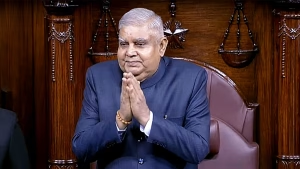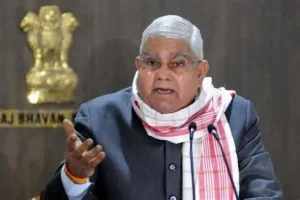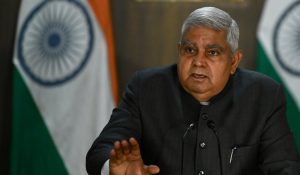Jagdeep Dhankhar Steps Down as Vice President of India to Focus on Health and Recovery
On July 21, 2025, India’s Vice President Jagdeep Dhankhar submitted his resignation, citing pressing health concerns and the need to follow medical advice. The resignation, addressed to President Droupadi Murmu, was effective immediately and made under the provisions of Article 67(a) of the Constitution of India.
In his letter, Dhankhar stated:
“To prioritise health care and abide by medical advice, I hereby resign as the Vice President of India, effective immediately.”
The move brought an abrupt end to his term, originally set to run until August 2027, having assumed office on August 11, 2022.
Also Read : Malcolm‑Jamal Warner Dies at 54 While Vacationing in Costa Rica: A Look at His Life, Career, and Legacy

Dhankhar Thanks President, Prime Minister, and Members of Parliament
Alongside the formal resignation, Jagdeep Dhankhar offered a heartfelt note of gratitude to the nation’s top constitutional authorities. He expressed sincere appreciation for President Murmu, citing a “soothing and respectful working relationship.” The Vice President also acknowledged Prime Minister Narendra Modi and the Council of Ministers for their consistent support during his tenure.
In his letter, Dhankhar reflected:
“The warmth, trust, and affection I have received from all Hon’ble Members of Parliament will forever remain embedded in my memory.”
He described his role as Vice President and Chairman of the Rajya Sabha as a period of “deep satisfaction and meaningful experience,” particularly amid India’s transformative progress on the global stage. He noted pride in witnessing India’s “phenomenal rise and exponential growth.”
Jagdeep Dhankhar’s Resignation Follows Months of Health-Related Incidents and Hospitalisation
The Jagdeep Dhankhar resignation comes after a string of public health episodes. In March 2025, he was admitted to AIIMS, New Delhi, for a heart-related procedure. His condition required a four-day stay in critical care.
More recently, on June 25, Dhankhar fainted while attending a university convocation event in Nainital, Uttarakhand, further intensifying concerns about his health and fitness to continue official duties.
Although no specific illness has been disclosed, sources close to the matter suggest that these incidents were a deciding factor in his early departure from the vice-presidential office.
Timing of the Resignation on First Day of Monsoon Session Sparks Political Speculation
The resignation came on the opening day of Parliament’s Monsoon Session, a moment that magnified its political implications. Just hours before submitting his resignation, Dhankhar was seen presiding over proceedings in the Rajya Sabha.
Opposition leaders reacted with surprise. Senior Congress leader Jairam Ramesh commented:
“There is more than meets the eye.”
While the government has refrained from elaborating on the situation, political observers believe the decision could reshape legislative dynamics in the upper house. For now, speculation remains unverified and unconfirmed.
What the Indian Constitution Says About Vice Presidential Vacancies and Rajya Sabha Leadership
Under Article 67(a) of the Constitution, a Vice President may resign by submitting a written letter to the President. However, the Constitution does not lay out a detailed succession plan in the event of a mid-term resignation.
As per protocol, the Deputy Chairperson of the Rajya Sabha, or a member nominated by the President, will assume the responsibility of chairing sessions until a new Vice President is elected. The Election Commission of India is expected to announce the schedule for the next vice-presidential election shortly. As mandated, the election must be conducted within six months of the vacancy.

A Distinguished Political Career That Spanned Law, Legislation, and Constitutional Roles
Born in 1951 in Rajasthan, Jagdeep Dhankhar started his professional journey as a lawyer and built a reputation in constitutional and commercial law. His political career includes:
- Member of Lok Sabha from Jhunjhunu, Rajasthan (1989–1991)
- Minister of State for Parliamentary Affairs (1990–1991)
- Member of the Rajasthan Legislative Assembly (1993–1998)
- Governor of West Bengal (2019–2022)
Dhankhar was elected as the 14th Vice President of India in August 2022, defeating Opposition candidate Margaret Alva. He was widely recognized for his assertive conduct in the Rajya Sabha, especially during debates over key government legislation.
The Jagdeep Dhankhar resignation marks the end of a distinguished chapter in Indian politics, shaped by constitutional engagement and governance.
What Happens Next: Vice Presidential Election and Interim Parliamentary Leadership
With Dhankhar’s departure, the Vice President’s post stands vacant. The Election Commission is now responsible for conducting a fresh election to fill the position. The new Vice President will be elected by an electoral college comprising both Lok Sabha and Rajya Sabha members, including nominated MPs.
Until then, parliamentary proceedings in the Rajya Sabha will be overseen by the Deputy Chairperson or an authorized member appointed by the President.
This transition arrives at a critical time, with the government expected to table multiple bills during the Monsoon Session. The absence of a full-time Rajya Sabha chairperson could impact legislative momentum and floor management.


Dhankhar Leaves Office with Dignity Amid Personal Challenges and National Respect
The Jagdeep Dhankhar resignation stands as a moment of significant political transition. His exit, though prompted by personal health challenges, was conducted with grace, transparency, and institutional respect. As India prepares for the upcoming vice-presidential election, the contributions of Jagdeep Dhankhar—as a legal scholar, governor, and Vice President—will be remembered.
While speculation about his departure continues, what remains certain is that Dhankhar’s service reflected dedication to democratic processes and constitutional values.

